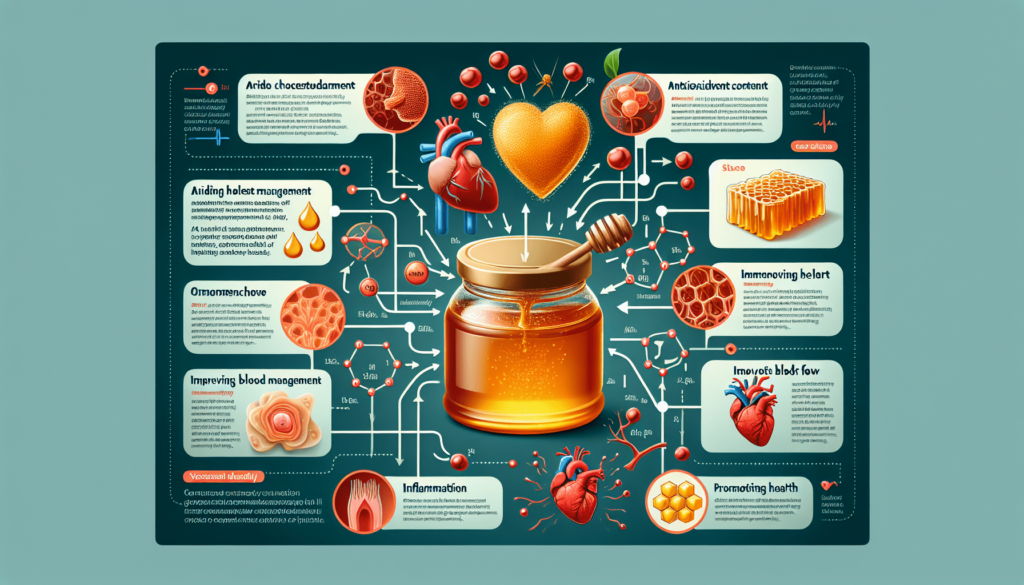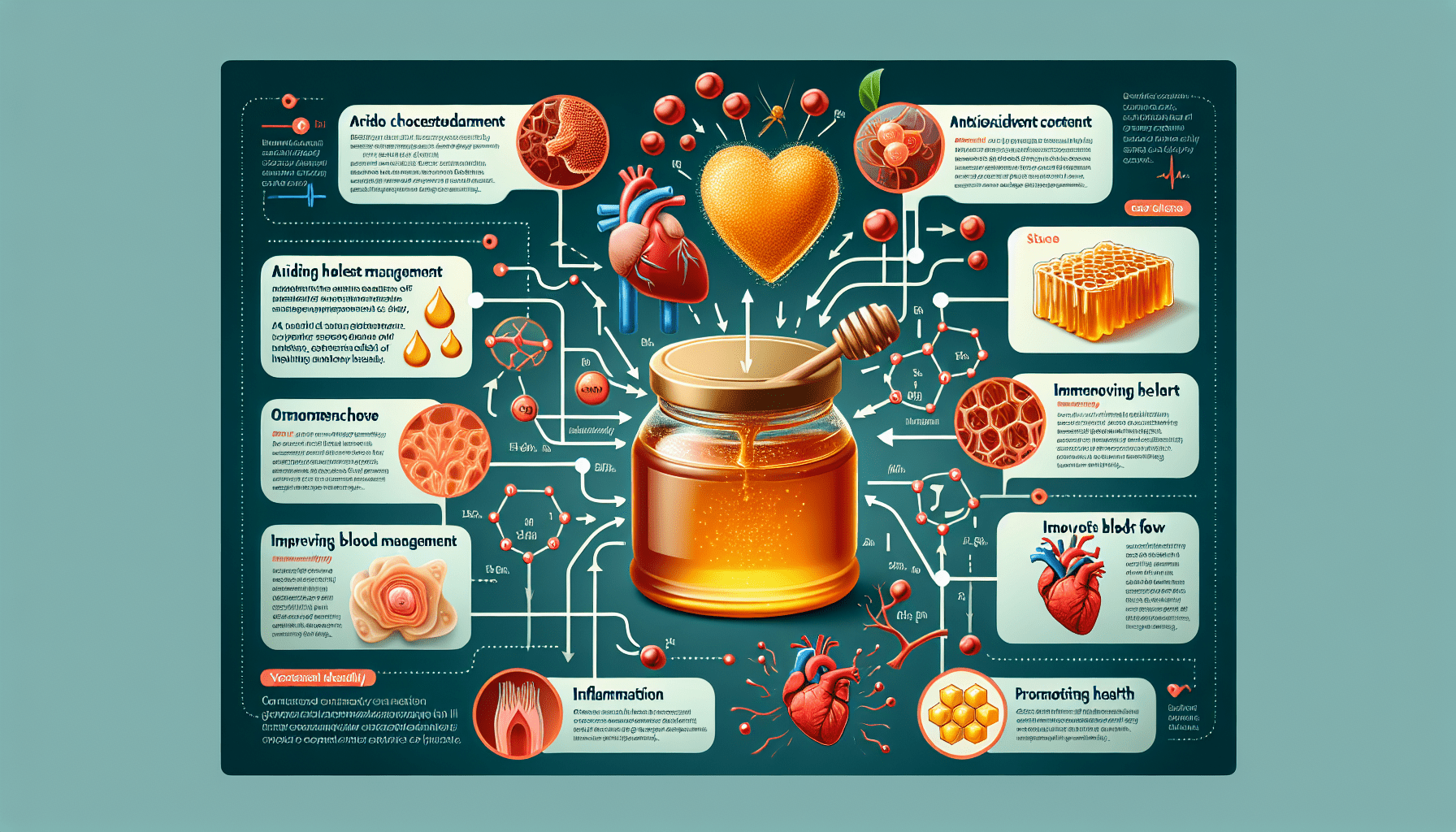In this article, you will discover the incredible ways in which honey can support your cardiovascular health and help manage cholesterol levels. With its natural sweetness and numerous health benefits, honey has been used for centuries as a natural remedy for a variety of ailments. From promoting heart health to reducing bad cholesterol, honey is a delicious and nutritious addition to your daily diet. So, if you’re curious about how honey can support your cardiovascular health and cholesterol management, read on to uncover the secrets behind this golden liquid’s impressive healing properties.

What is Cardiovascular Health?
Definition
Cardiovascular health refers to the overall well-being of your heart and blood vessels. It encompasses the proper functioning of these vital organs and plays a crucial role in maintaining overall health and longevity. The cardiovascular system is responsible for pumping oxygenated blood throughout your body, supplying nutrients, and removing waste products. Maintaining cardiovascular health is essential for overall well-being, as it lowers the risk of heart disease, stroke, and other cardiovascular conditions.
Importance
Taking care of your cardiovascular health is of utmost importance. Poor cardiovascular health can lead to a variety of serious health conditions, including heart disease, heart attack, stroke, and high blood pressure. These conditions can significantly impact your quality of life and even be life-threatening. By prioritizing cardiovascular health, you can lower the risk of these conditions and enjoy a healthier, longer life.
Common Issues
There are several common issues that individuals may face in relation to their cardiovascular health. These include high blood pressure, high cholesterol levels, heart disease, and atherosclerosis. While some of these issues may have genetic components, lifestyle factors such as an unhealthy diet, lack of exercise, and smoking can also contribute to their development. Regular check-ups and adopting a heart-healthy lifestyle can help prevent or manage these common cardiovascular issues.
What is Cholesterol?
Definition
Cholesterol is a waxy substance found in the body that is necessary for the production of hormones, vitamin D, and substances that aid in digestion. It is produced by the liver and can also be obtained through certain foods. Cholesterol travels through the bloodstream in the form of lipoproteins, which are made up of proteins and fats.
Types of Cholesterol
There are two main types of cholesterol: low-density lipoprotein (LDL) and high-density lipoprotein (HDL). LDL cholesterol is often referred to as “bad” cholesterol because high levels can lead to the buildup of plaque in the arteries, increasing the risk of heart disease. HDL cholesterol, on the other hand, is known as “good” cholesterol as it helps remove LDL cholesterol from the bloodstream, reducing the risk of heart disease.
Importance
Maintaining healthy cholesterol levels is crucial for cardiovascular health. It is important to strive for lower levels of LDL cholesterol and higher levels of HDL cholesterol to reduce the risk of heart disease and other cardiovascular conditions. High levels of LDL cholesterol can lead to the formation of fatty deposits in the arteries, restricting blood flow and increasing the risk of heart attack and stroke. On the other hand, higher levels of HDL cholesterol help protect against these conditions by removing LDL cholesterol from the arteries.
The Link between Honey and Cardiovascular Health
Positive Effects on Heart Health
Honey has been used for centuries as a natural remedy for various health conditions, and emerging research indicates that it could have positive effects on heart health. Consuming honey regularly has been associated with a reduced risk of heart disease and improved cardiovascular function. The natural sugars found in honey provide a quick source of energy for the heart, helping it function optimally.
Reducing Inflammation
Chronic inflammation is a key underlying factor in the development of cardiovascular diseases. Honey has been found to possess anti-inflammatory properties, which can help reduce inflammation within the cardiovascular system. By reducing inflammation, honey may help lower the risk of heart disease, as inflammation is a contributing factor to the development of atherosclerosis and plaque buildup in the arteries.
Lowering Blood Pressure
High blood pressure, also known as hypertension, is a significant risk factor for heart disease and stroke. Studies have shown that regular consumption of honey may help lower blood pressure levels, particularly in individuals with hypertension. The antioxidants present in honey play a role in improving the function of blood vessels, which can help regulate blood pressure and reduce the strain on the cardiovascular system.

Honey’s Impact on Cholesterol Levels
Lowering LDL Cholesterol
LDL cholesterol plays a significant role in the development of cardiovascular diseases. Consuming honey has been shown to have a positive impact on LDL cholesterol levels. Several studies have demonstrated that regular intake of honey can lead to a decrease in LDL cholesterol levels, thus reducing the risk of plaque formation in the arteries. The antioxidants in honey help prevent LDL cholesterol from oxidizing, a process that makes it more harmful to the cardiovascular system.
Increasing HDL Cholesterol
Honey may also have a beneficial effect on HDL cholesterol levels. HDL cholesterol is responsible for removing LDL cholesterol from the arteries and transporting it back to the liver for elimination. Studies have shown that honey consumption can increase levels of HDL cholesterol, further enhancing its role in protecting against heart disease. By increasing HDL cholesterol levels, honey promotes the removal of harmful cholesterol from the bloodstream.
Reducing Triglyceride Levels
Triglycerides are a type of fat found in the blood and high levels are associated with an increased risk of heart disease. Research suggests that honey consumption may help lower triglyceride levels in the bloodstream. The natural sugars present in honey can be metabolized more efficiently than refined sugars, leading to a decreased production of triglycerides. By reducing triglyceride levels, honey contributes to the overall improvement of cardiovascular health.
Key Compounds in Honey for Cardiovascular Health
Polyphenols
Polyphenols are naturally occurring compounds found in plants that have antioxidant properties. Honey contains various polyphenols, including flavonoids and phenolic acids, which have been shown to have beneficial effects on cardiovascular health. These compounds help reduce inflammation and oxidative stress, both of which are key factors in cardiovascular diseases.
Flavonoids
Flavonoids are a type of polyphenol that have been extensively studied for their potential health benefits, including cardiovascular health. Honey is rich in different types of flavonoids, such as quercetin and kaempferol. Flavonoids have antioxidant and anti-inflammatory properties that can help protect against heart disease, reduce the risk of blood clots, and lower blood pressure.
Antioxidants
Honey is a rich source of antioxidants, which help protect the body against the harmful effects of free radicals. Free radicals are unstable molecules that can cause damage to cells and contribute to the development of various diseases, including cardiovascular diseases. The antioxidants present in honey neutralize these free radicals, reducing oxidative stress and inflammation within the cardiovascular system.
Scientific Studies on Honey and Cardiovascular Health
Study 1: Effects of Honey on Cholesterol Levels
A study published in the Journal of Medicinal Food investigated the effects of honey consumption on cholesterol levels in healthy individuals. The researchers found that consuming honey daily for eight weeks resulted in a significant decrease in total cholesterol, LDL cholesterol, and triglyceride levels. These findings suggest that honey intake can positively impact cholesterol levels and contribute to better cardiovascular health.
Study 2: Honey and Heart Disease Prevention
Another study published in the International Journal of Food Sciences and Nutrition examined the relationship between honey consumption and heart disease risk factors. The participants who consumed honey regularly showed a decrease in LDL cholesterol levels and an increase in HDL cholesterol levels. This study suggests that incorporating honey into the diet may help prevent heart disease by improving cholesterol levels.
Study 3: Honey’s Anti-Inflammatory Properties
A study published in the Journal of Applied Physiology investigated the effects of honey on inflammation markers in individuals with high cholesterol levels. The researchers found that honey consumption resulted in a significant reduction in inflammation markers, indicating its potential anti-inflammatory effects. By reducing inflammation, honey may help protect against the development of cardiovascular diseases.
Integrating Honey into a Heart-Healthy Diet
Choosing Raw and Unprocessed Honey
To reap the maximum benefits for cardiovascular health, it is important to choose raw and unprocessed honey. Raw honey is not subjected to high levels of heat or filtration, preserving its natural compounds and potential health benefits. Look for honey that is labeled as raw and unprocessed to ensure you are getting the most out of its cardiovascular-supporting properties.
Moderation and Portion Control
While honey can have positive effects on cardiovascular health, it is essential to consume it in moderation. Honey is still a source of calories, and excessive intake can lead to weight gain and an increased risk of certain health conditions. Portion control is key when incorporating honey into a heart-healthy diet. It is recommended to limit daily honey consumption to 1-2 tablespoons.
Replacing Unhealthy Sweeteners with Honey
One way to incorporate honey into a heart-healthy diet is by replacing unhealthy sweeteners, such as refined sugars and high-fructose corn syrup, with honey. Honey provides natural sweetness without the added processed sugars. Use honey as a natural sweetener in teas, smoothies, and baked goods to enjoy its health benefits while reducing the intake of unhealthy sweeteners.
Other Lifestyle Factors for Cardiovascular Health
Regular Exercise
In addition to incorporating honey into your diet, regular exercise is essential for maintaining cardiovascular health. Engaging in aerobic exercises, such as brisk walking, jogging, swimming, or cycling, helps strengthen the heart and improve circulation. Aim for at least 150 minutes of moderate-intensity exercise or 75 minutes of vigorous exercise per week to support your cardiovascular system.
Balanced Diet
A balanced diet plays a crucial role in maintaining cardiovascular health. Focus on consuming a variety of nutrient-dense foods, including fruits, vegetables, whole grains, lean proteins, and healthy fats. Limit the intake of saturated fats, trans fats, and cholesterol-rich foods. Incorporate honey as part of a balanced diet to enhance the nutritional value of your meals.
Stress Management
Chronic stress can take a toll on cardiovascular health. Stress triggers the release of stress hormones that can raise blood pressure and contribute to the development of heart disease. Finding healthy ways to manage stress, such as practicing meditation, yoga, or engaging in hobbies, can support cardiovascular health. Incorporating mindfulness techniques into your daily routine can also help reduce stress levels.
Recipes and Tips for Including Honey in Heart-Healthy Meals
Honey-Glazed Salmon
Ingredients:
- 4 salmon fillets
- 2 tablespoons honey
- 2 tablespoons low-sodium soy sauce
- 1 tablespoon fresh lemon juice
- 1 teaspoon grated ginger
- 2 cloves of garlic, minced
Instructions:
- Preheat the oven to 400°F (200°C).
- In a small bowl, whisk together honey, soy sauce, lemon juice, ginger, and garlic.
- Place the salmon fillets on a baking sheet lined with parchment paper.
- Pour the honey glaze mixture over the salmon fillets, ensuring they are fully coated.
- Bake for 12-15 minutes or until the salmon is cooked through and flakes easily with a fork.
- Serve the honey-glazed salmon with a side of steamed vegetables or a fresh green salad.
Greek Yogurt with Honey and Berries
Ingredients:
- 1 cup Greek yogurt
- 1 tablespoon honey
- 1 cup mixed berries (such as strawberries, blueberries, and raspberries)
- 1 tablespoon chopped nuts (optional)
Instructions:
- In a bowl, combine Greek yogurt and honey, mixing well.
- Top the yogurt with mixed berries and sprinkle with chopped nuts, if desired.
- Drizzle a little extra honey on top for added sweetness, if desired.
- Enjoy this refreshing and nutritious snack as a part of your heart-healthy diet.
Honey-Sweetened Oatmeal
Ingredients:
- 1 cup rolled oats
- 2 cups water or milk of your choice
- 1 tablespoon honey
- 1/4 cup chopped nuts
- 1/4 cup fresh berries
- 1 tablespoon chia seeds (optional)
Instructions:
- In a saucepan, bring water or milk to a boil.
- Stir in the rolled oats and reduce the heat to low. Simmer for about 5 minutes or until the oats are cooked to your desired consistency, stirring occasionally.
- Remove the saucepan from heat and stir in honey.
- Serve the honey-sweetened oatmeal in bowls and top with chopped nuts, fresh berries, and chia seeds, if desired.
- Enjoy a warm and nutritious bowl of oatmeal to start your day on a heart-healthy note.
Conclusion
Honey has been shown to have numerous benefits for cardiovascular health and cholesterol management. Its positive effects on heart health, ability to reduce inflammation, and impact on cholesterol levels make it a valuable addition to a heart-healthy lifestyle. The key compounds in honey, such as polyphenols, flavonoids, and antioxidants, contribute to its beneficial effects on cardiovascular health. Incorporating honey into a balanced diet, along with regular exercise, stress management, and other healthy lifestyle factors, can help promote cardiovascular well-being and reduce the risk of heart disease. So go ahead, enjoy the natural sweetness and potential health benefits of honey while taking care of your cardiovascular health.

